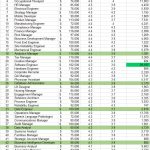5 Jobs That Will Be The Hardest To Fill In 2025
With low labor-force participation, declining immigration levels, and the looming retirement of baby boomers on the horizon, the U.S. labor market is tightening and driving up wages. Over the next decade, the country will experience a labor shortage that will disproportionately affect some industries and professions, predicts an April 2016 report from The Conference Board.
“We may see policy or other changes over the next 10 years that could influence us greatly,” says Phil Noftsinger, CPA, the creator of the CBIZ Small Business Employment Index (SBEI), which has tracked small companies’ hiring trends since 2009. He cites pushback on free trade that might increase domestic manufacturing jobs or the rate at which automation will change demand for jobs in clerical and accounting sectors, for example.
Which sectors are most at risk for labor shortages? They’re not necessarily the fastest-growing sectors, but those where entrants into the field are not keeping up with demand. Fields like computer sciences aren’t at risk, The Conference Board report finds, but a few, more traditional sectors are. While not a comprehensive list, five key areas are predicted to be among the hardest hit over the next decade.
Skilled Trades
Electricians and machinists both made the top 10 on The Conference Board’s labor shortages index, while other jobs at high risk include plant and system operators and rail transportation workers. These jobs have large numbers of workers retiring, but fewer young people choosing these careers, which are also difficult to offshore or fully automate. But the successful trade worker of the future is going to be one who has a comfort level with advanced machinery, says Kip Wright, senior vice president of human resources consulting firm Manpower North America.
For example, as welders’ tools become more sophisticated and effective, using automation to create better results, the focus on the individual’s expertise may shift to understanding the chemistry of the compounds that are being welded to further improve the process, he says. “That’s a very different skill set, even though it would still be skilled trade workers,” he adds.
Health Care
As the population of baby boomers ages and has increasing health issues, health care workers of all types will be in greater demand. Occupational and physical therapy aides are at the highest risk of shortage, according to The Conference Board report, with health diagnosing and treating professionals ranking third. Physician and nursing professions require high levels of education that may be out of reach for some. However, jobs like home health aides may not pay enough to attract the numbers of workers necessary to meet demand, says management consultant and venture capitalist Peter Cohan, lecturer of strategy at Babson College.
Manufacturing
Surprisingly, U.S. manufacturing is facing down a shortage of 2 million workers by 2020 in areas ranging from engineering to production workers, according to 2015 research by Deloitte. The research found that while more than half give manufacturing careers high marks when it comes to rewarding careers and compensation, just 37% would encourage their children to seek a career in manufacturing. Millennials surveyed ranked it last of seven categories as their choice of career to start today.
Sales
Even as people can buy virtually anything online with a few clicks, salespeople will be in high demand. There is vast demand for people who have a combination of social and cognitive skills and who also have the ability to position a product or service in a way that makes customers want to buy it, Wright says. Such specific skill combinations will make it tough to fill demand.
Math-Related Fields
It may seem surprising that STEM jobs as a whole are not predicted to be at risk for shortages. That risk is mitigated by the increasing number of young people choosing these careers, as well as immigrants who work in this area, The Conference Board report finds. However, math-focused jobs like actuaries and statisticians face high risk of labor shortages. Add the demand for mathematical thinking posed by the big-data sector, and you have a strong, growing need for people with math backgrounds, and not enough people choosing math as a career path, Cohan says.
Related Video: Can You Handle A Career Change?
Fast Company , Read Full Story
(12)














